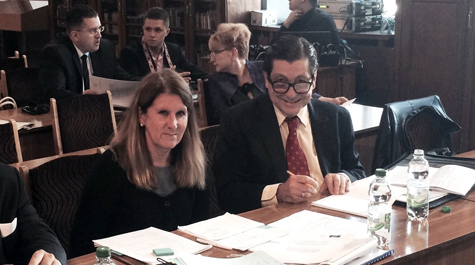Professor Christie Warren Consults with Ukrainian Constitutional Commission
Professor Christie Warren recently traveled to Ukraine on behalf of USAID and the FAIR Justice Project to consult with members of Parliament, the Constitutional Commission, the government, academics and civil society organizations on draft amendments to the 1996 constitution. The Constitutional Commission, established in March 2015 by Ukrainian President Petro Poroshenko, is currently considering constitutional amendments in the areas of the judicial branch, decentralization and human rights. Before leaving for Ukraine, Warren and Professor Louis Aucoin of the Fletcher School of Law and Diplomacy completed a 100-page analysis of proposed draft amendments and whether they complied with international and regional laws to which Ukraine is a party, followed by a comparative analysis of the way eight other countries in the region have addressed similar issues. The assignment reflected Warren's strategy of providing an array of options to actors involved in constitutional drafting and amendment processes, as opposed to advising drafters what to do.
"We gave examples and provided options for how the Commission could structure amendments," said Warren. "This is one way we believe international advisors can be most effective during constitutional processes. This approach also ensures that substantive decisions that are made are made by national actors, not by international advisors." Often Warren and her colleagues also consult with citizens and civil society organizations to find out what is not working in a country from their point of view. This kind of input helps translate day-to-day concerns of ordinary people into constitutional language that might otherwise be difficult to articulate.
Over the past two decades, Professor Warren has provided this type of assistance in more than 40 countries, including Somalia, Haiti, and Iraq, for the United Nations, USAID, the State Department and various inter-governmental organizations. In addition to her field work and teaching responsibilities, Warren also founded and directs the Law School's Center for Comparative Legal Studies and Post-Conflict Peacebuilding and serves as Senior Technical Advisor to the Constitution Building Processes Program, part of the International Institute for Democracy and Electoral Assistance at the Hague.
As Professor of the Practice of International and Comparative Law, Warren's field work shapes her teaching methodologies at William & Mary and allows her to give her students insights into the way constitutions actually work in other countries. "The goal is not simply to teach constitutional or Supreme Court jurisprudence," she says. "Instead, we look thematically at constitutional frameworks and issues and the way specific language and implementation affect governance and rights. This approach is especially useful when studying countries emerging from conflict, where imbalances of power are often at the root of instability."
Warren believes this kind of training will be crucial for law school graduates as the world becomes more globalized. "I have no doubt that students graduating now will come face to face with international legal issues over the course of their careers," she says. "An ability to transcend narrow domestic legal perspectives will become increasingly important as time goes on, and lawyers with this type of background will have a competitive advantage in the global legal economy."
The Center for Comparative Legal Studies and Post-Conflict Peacebuilding furthers these goals by providing students with opportunities to gain concrete work experience and engage in public service activities around the world. Through the Center's work, William & Mary law students regularly conduct research for governments, programs and organizations in developing and post-conflict countries. Each summer, more than 20 students intern abroad. You can read about recent interns' experiences on the Center's Voices from the Field page.
About William & Mary Law School
Thomas Jefferson founded William & Mary Law School in 1779 to train leaders for the new nation. Now in its third century, America's oldest law school continues its historic mission of educating citizen lawyers who are prepared both to lead and to serve.
